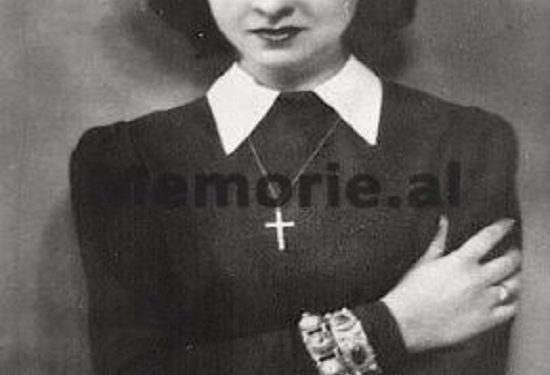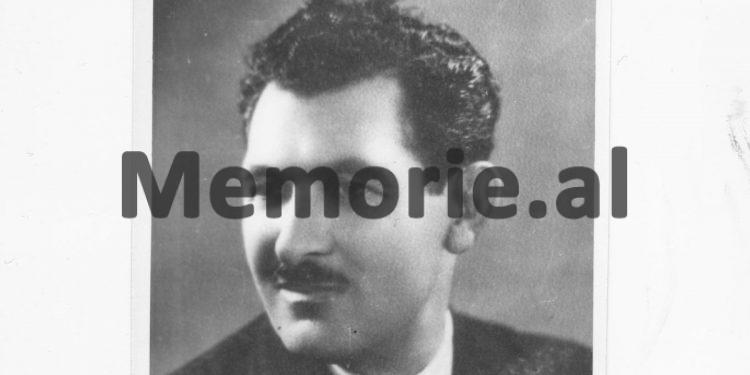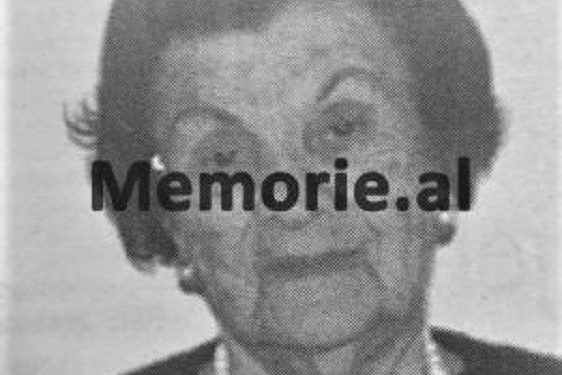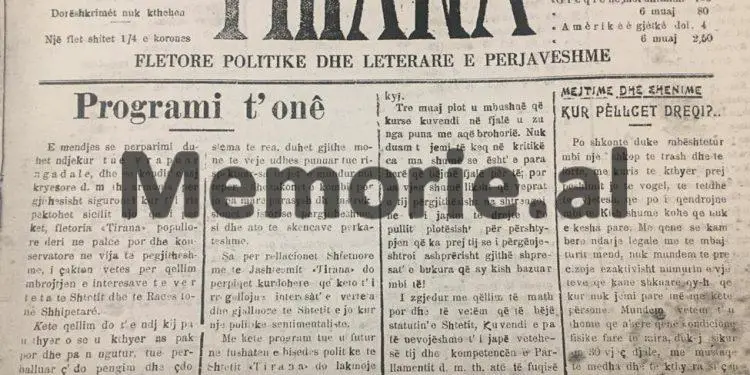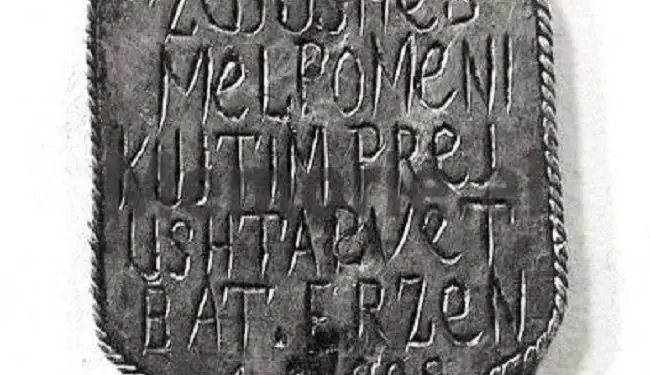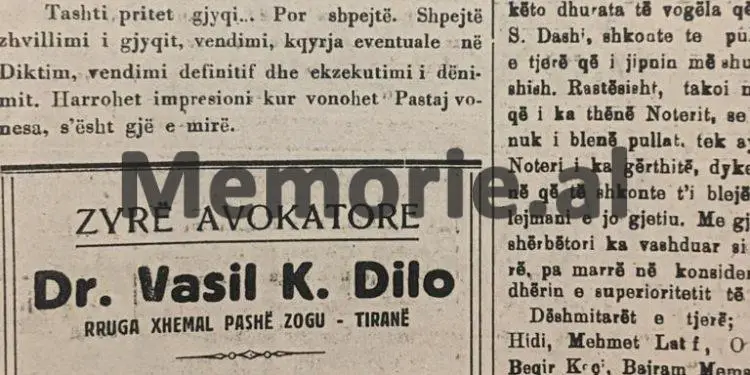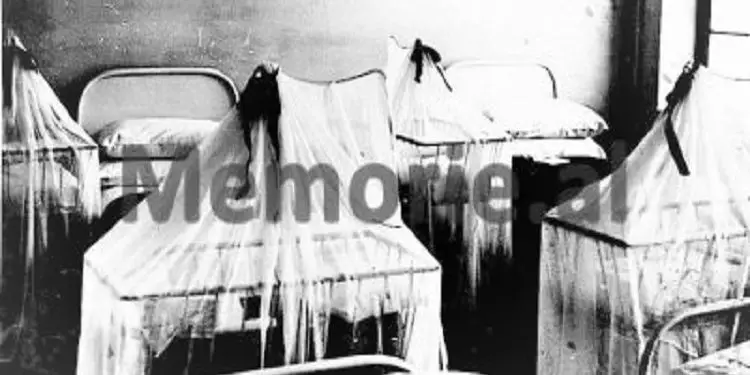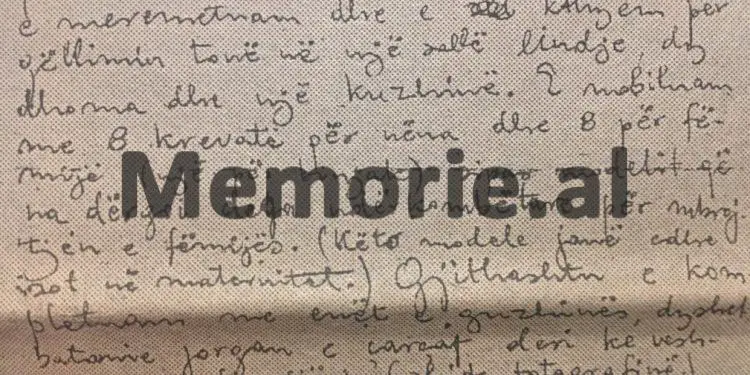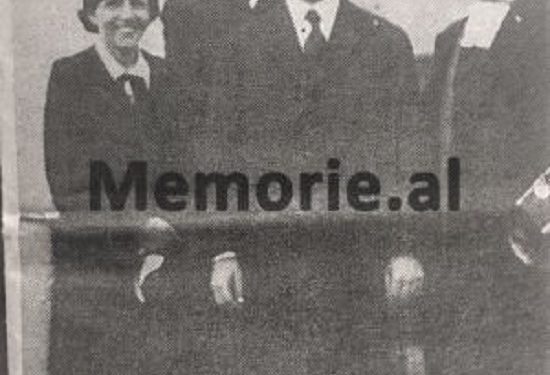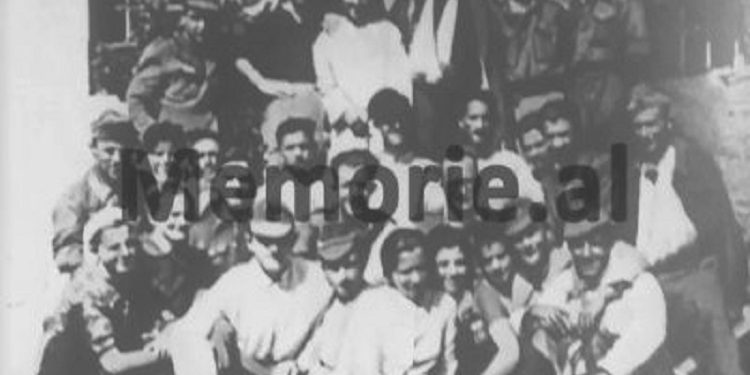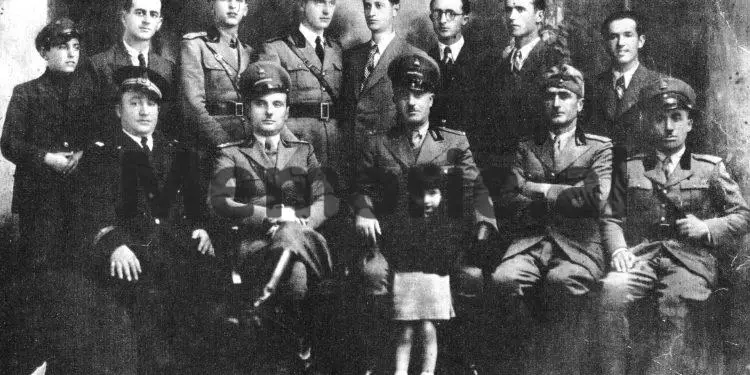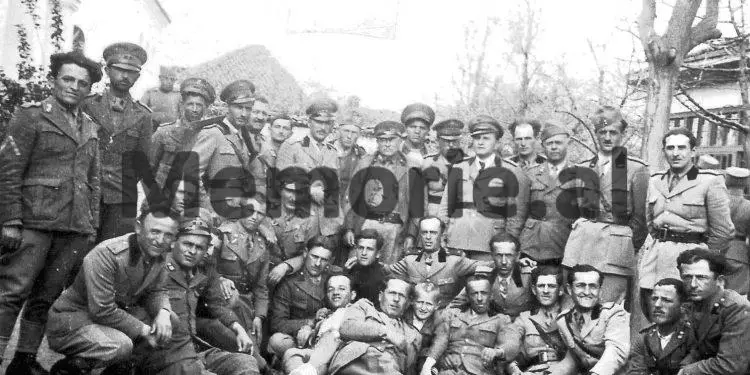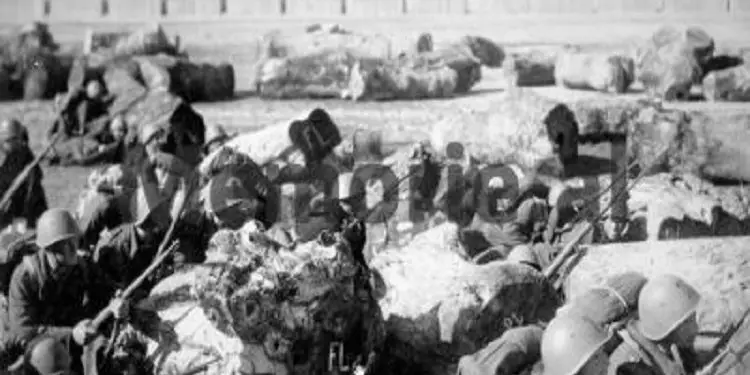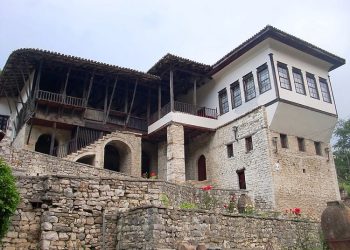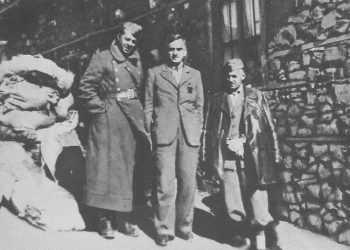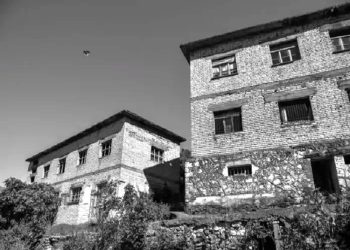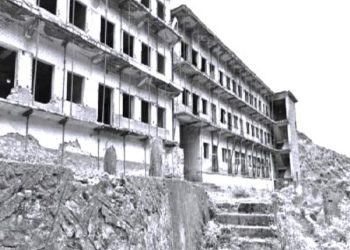Dashnor Kaloçi
Memorie.al publishes the unknown story of Melpomeni Dilos, one of the four daughters of Vasil Dilos, originally from Gjirokastra (lawyer of Zef Malë in the famous trial of March ’39, where Qemal Stafa was also convicted) who graduated for Justice in Istanbul and since 1920 throughout the period of the Zog Monarchy, in addition to practicing the profession of lawyer, opened the newspapers “Omonia” in Gjirokastra and “Tirana” in Tirana, which became “shelter” of Albanian patriotic intellectuals of that time, against the greedy intentions of the Greek chauvinist circles for the so-called problem of Voroi-Epirus, where Vasili was one of the most famous publicists.
Melpomeni Dilos’ education at the three-year nursing school in Tirana at that time was at Rruga e Dibra, directed by the French citizen Gabriela Laverngie, where after her graduation, she volunteered and went to the “Erzeni” Battalion, treating the soldiers in the epidemic. heavy 1929, whereas a token of gratitude, they presented him with a silver medal, which forced the then Prime Minister, Koço Kota, to send him a letter of thanks.
Specialization for three years in Paris by Melpomene and return to Albania, where she together with her two friends, Nadide Kasaruho and Bedije Asllani, took the initiative and opened the first maternity hospital in Albania, having the help of the people of Tirana, the Cross of International Red, and the Director of the Civil Hospital. Dr. Sabri Tefikut, who offered some facilities, which they adapted for maternity wards and went out on their own through Tirana, asking the new mothers to come to that new hospital.
The testimony of Xanthipi Dilos for her sister, Melpomenin, who volunteered and went to Durrës with the trucks that departed from “Skënderbej” Square in Tirana, being the only girl who fought against the Italians in the fascist aggression of April 7, ’39, and then during the War (1939-1944) she treated as medical assistants members of guerrilla units and wounded partisans, but after the end of the war, she was left jobless and never allowed to work in the Obsertik Service. – Gynecology that she had founded during the Monarchy period, after in 1945, her two brothers, Telemaku and Koço Dilo, were convicted as “enemies of the people” and suffered years in prison and internment in the communist regime.
On the morning of April 7, 1939, when “Skenderbej” Square in the center of Tirana was filled with hundreds of people who wanted to go voluntarily to the city of Durrës where the invading Italian aggressors were landing, my sister, Melpomeni, also came. who put on the nurse’s uniform and climbed into one of the cars that was full of volunteers. Melpomene’s appearance in that square and her riding in the car made a great impression and was accompanied by enthusiastic calls from all the people running embracing and kissing the white apron because she was the only girl who was going to Durres to fight against the Italians ”. This is how she remembered the story of her sister, Melopmen, Xanthipi Dilo, who in the period of the Kingdom of Zog, graduated from the American School of Dako in Kamza, Tirana. But who was Melpomene Dilo, where she was educated and how did she manage in 1929 to create the first Obsertik-Gynecological service in Albania? How and why was the Dilo family hit by the communist regime of Enver Hoxha and how did her two brothers, Koço and Telemaku, end up in prisons and internments, being accused of being agents of the Anglo-Americans ?! Why didn’t the communist regime offer jobs to Melpomene, a medical assistant who specialized in France and who during the war years had helped by illegally treating many of the wounded guerrillas and partisans ?!
Dilo family
Melpomene was born in 1912 in the city of Gjirokastra and was the third of six daughters and three sons to Vasil Dilo, who had completed his higher studies in Law in Istanbul. Around 1910-1920, Vasili became very popular not only in the stone town of Gjiroikastra but also in the whole country, because in addition to the profession of a lawyer where he had a great name, he wrote various articles in the press of the time. , is considered one of the most well-known and patriotic publicists who defended the Albanian cause from the greedy intentions of the Greek chauvinists on the issue of North Epirus. In 1923, with the fall of the Vlora government, after much effort Vasili managed to open a newspaper in the city of Gjirokastra, which he called “Omonia”, and at the head of that newspaper he published in two languages (Albanian and Greek ) he wrote: “Allah has set us free and we must live free.” Although the newspaper was called “Omonia” had nothing in common with the Greeks, on the contrary it was in open opposition to them and turned into one of the bodies that fought most against the goals and intentions of the Greek chauvinists who raised the so-called Voroio problem. Epirus. Given this fact, the Greeks intervened and made it possible for Vasil Dilo to be interned for some time in Tepelena. In 1920, when the War of Vlora was taking place, Vasili, among others, in his newspaper, “Omonia”, addressed the Greeks, saying: the road to Athens passes through Vlora, why don’t you go and fight there ”?! After 1920, Vasili and his family moved from Gjirokastra and settled in Tirana, where he did not stop his journalistic activity, after opening another newspaper, “Tirana”, which became a shelter for Albanian patriotic intellectuals of that time…
Melpomeni graduated in Paris
Vasil Dilo, himself an educated man and a well-known progressive intellectual, made sure that in addition to his three sons, he also educated his daughters. So he sent Melpomene to the three-year School of Nursing in Tirana, which at that time was on Rruga e Dibres where the French director, Gabriela Laverngie, was the director. In 1929, while Melpomene was studying at this school, a severe flu epidemic struck, affecting a large part of the population, especially the army. For this, in her memoirs, Melpomene writes: “At that time I was still at a young age, I volunteered as a nurse to serve with sick soldiers, who lacked not only medicine but also service. In the military unit of the “Erzeni” Battalion, where I was assigned, I served for more than two months and got to know the hard life of the soldiers closely. After the elimination of the epidemic, the soldiers of the “Erzeni” Battalion, as a sign of gratitude, gave me a silver medallion, which they had prepared with their savings. This grateful gesture of such soldiers forced the then Prime Minister to send me a letter of thanks. ” After graduating from high school with a high school diploma, Melpomene was granted a one-year study permit in Paris to specialize in raising infants. During that year she stayed in the French capital, was helped and supported by her uncle, Panajot Netti, who kept her at his home. In 1932, after finishing her specialization, she returned to Tirana and after some time she started working as an assistant doctor at the American School of “Dako” in Kamza, and then she started to open the first maternity hospital in Albania.
It opens the first maternity hospital in Albania
In her memoirs on maternity leave, Melpomene writes: “In those years, due to lack of medical care, mortality was inevitable, especially among young mothers and newborns, as most women the poor could not afford to pay the midwives and were born without medical help and assistance, thus endangering their lives. This fact inspired me and my two friends, Nadide Kasaruho and Bedije Asllani, to establish a Society for the Protection of Children. Our goal was to create a maternity ward with all the comforts for childbirth and medication. To this end, we relied on the people, and the campaign we launched in Tirana found great support. We contacted the International Committee of the Red Cross, which sent us a quantity of milk that we distributed to poor families and also the model of cribs for children. Quite difficult to solve was the problem of the building that would serve our purpose. For this, we met with the Director of the Hospital, Dr. Sabri Tefiku who welcomed our opinion and offered us the halls of the birth room and the former two-room morgue. We repaired this building and turned it into a two-room living room and a kitchen, furnishing it with eight beds for children according to the model sent to us by the International Branch for Child Protection (these models are still found in the old maturity of Tirana)… We also completed it with all the kitchen utensils, mattresses, quilts, sheets and even baby clothes. Thus, on April 15, 1937, the first Albanian maternity hospital in Albania was inaugurated, which was enthusiastically received by progressive circles and all the people. But that didn’t stop there, because we had to do a lot of work and propaganda going from neighborhood to neighborhood where there were women to give birth to come to our maternity ward “, wrote among others the mayor Dilo regarding the opening. of the first maternity hospital in Albania, where she had a leading role and contribution.
On April 7, the fight in Durrës
In April 1939, when fascist Italy carried out a military aggression against Albania, hundreds of volunteers gathered in Skanderbeg Square in central Tirana to seek refuge in Durres. In this regard, Xanthippi recalls: “On the morning of April 7, Melpomene came out. She, after obtaining permission from her father, Vasili, put on the nurse’s uniform and went to the square riding in one of the cars that were full of volunteers and Melpomene was the only woman, so what was received with applause and the people of Tirana approached in the car they kissed his hands and the white apron on his sleeves. From this scene, we, the sisters and brothers who had come out to accompany her, filled our eyes with tears “, Ksanthipi recalls without holding back tears like April 7, 1939 when her sister Melpomene left to fight in Durres. Melpomene not only took care of the wounded as a nurse, but she also seized the weapon and lined up with the volunteers in positions previously assigned to them by the Commander-in-Chief of the National Defense, Major Abaz Kupi. One of the people who sheds light on this fact is the colonel, Dr. Sinan Imami, a former doctor and director of the Military Hospital, who in 1962 testified: “I remember that on April 7, 1939, Melpomene Dilo joined the volunteer forces that went to Shijak and Durrës for him. fought the invading Italian fascist forces and was the only girl in those moments who went to war working with us as a nurse ”. Kdeshimi also recalls that during the war years (1939-1944), Melpomene became active with the Anti-Fascist Movement, helping many of the wounded guerrillas and partisans, whom he treated secretly at the Tirana Civil Hospital, such as Sotir Spiro, Vasil Nathanailin, etc…
Persecution and oblivion
Although the Dilo family all connected with the Anti-Fascist Movement and their house on Dibra Street became one of the strongest bases where Qemal Stafa, Vasil Shanto, Koço Tashko, etc. were housed, after the end of the war, in 1945, they were beaten by the communist regime, accused of being reactionary families, even though Vasili had defended the leaders of the Communist Group of Shkodra at the famous March 1939 trial, where Qemal Stafa was also convicted. This happened after the imprisonment of two brothers, Telemaku and Koço, who ran for parliament as independents in the December 2, 1945 elections, when he was arrested and sentenced to ten years in prison, while Telemaku, accused of being an “Anglo-agent” Americans and their liaisons with the UNRRA Mission ”. After this blow, Melpomene and the whole Dilo family were subjected to constant persecution. Regarding this, Xanthippe recalls: “After the imprisonment of our two brothers, Koço and Telemak, the communist government had caught our eye. Melpomene, who had set up the First Gynecological-Obsertik Service in Albania, had fought on April 7, 1939, in Durrës and during the War had treated members of Tirana’s guerrilla units and partisans, was not given the right to work in the profession. her as an assistant-physician. She lost her job until she passed away in 1971 and while she was alive she made many requests to be recognized for her contribution so that she could receive a pension, but that was never given to her. His brother, Gaqo, who worked for the prime minister, was also fired and could barely be arranged as a teacher. From the fierce struggle that took place in our family, none of our grandchildren were given the right to study in high schools “, testifies Xanthipi Dilo, on the history of her family and sister, Melpomeni, the only one Albanian girl who fought on April 7, ’39 in Durrës against the Italians, who were persecuted by the communist regime of Enver Hoxha until she passed away.
Memorie.al




